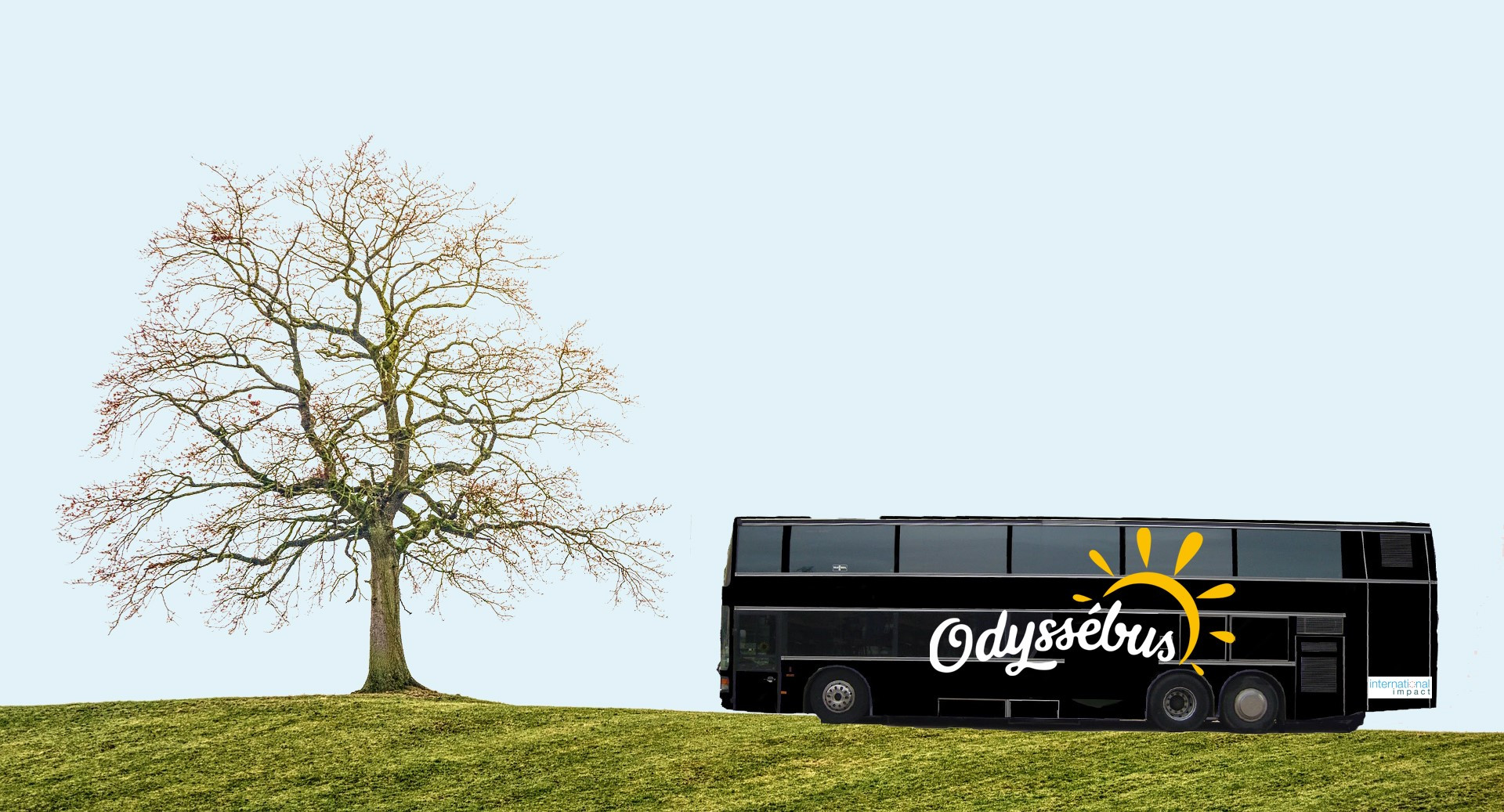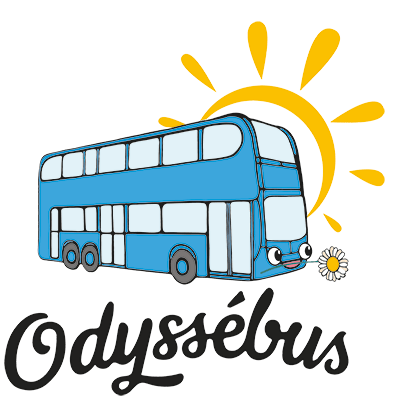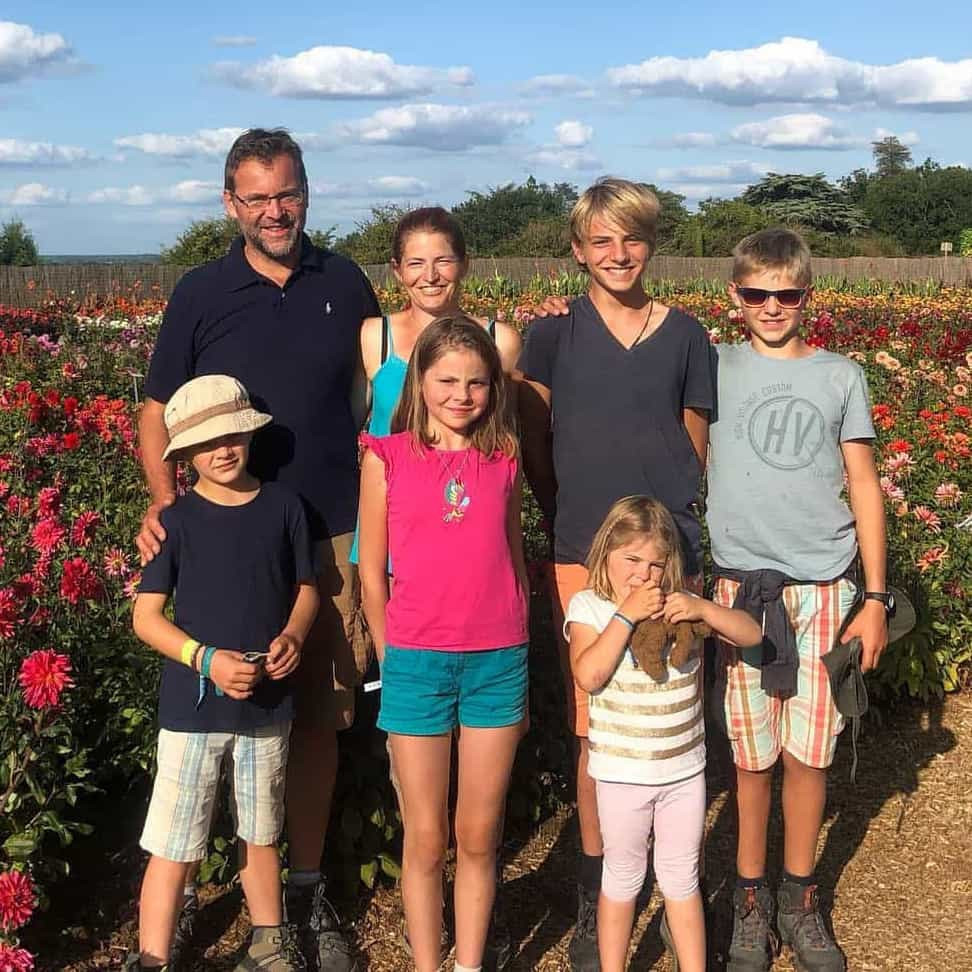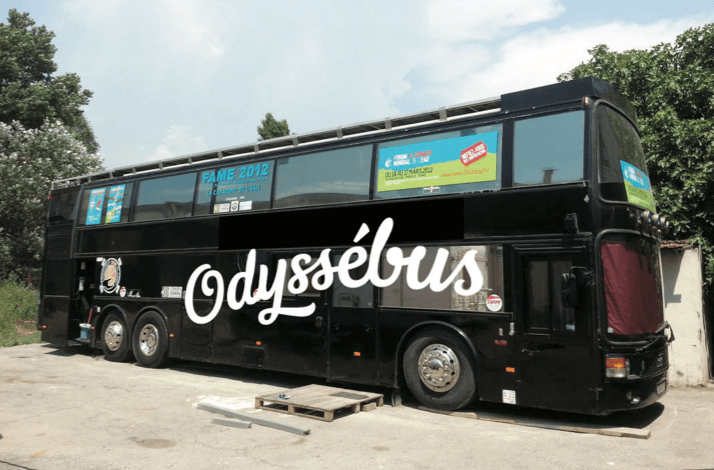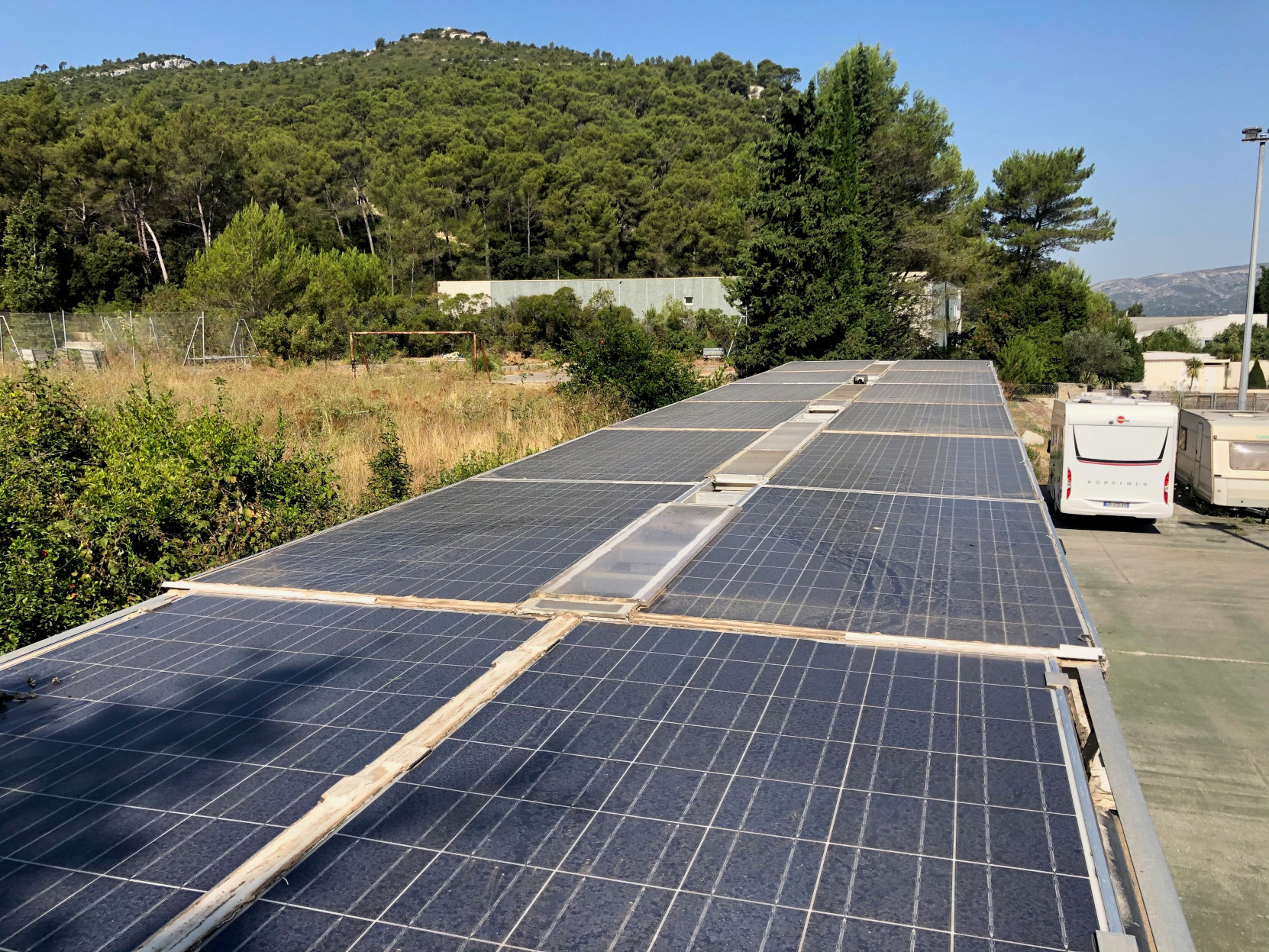Jean-Christophe Crespel (BBA 1995), Founder & Director of International Impact
Jean-Christophe Crespel (EDHEC International BBA 1995) has been pursuing a career rooted in social action and solidarity since the humanitarian world tour he completed between 2001 and 2003. He is currently preparing to head off again in July 2021 for a little over a year, this time with his wife and five children on board a double-decker bus with a roof covered in solar panels and an inbuilt rainwater collection system. This journey in their autonomous travelling home is known as the Odyssébus project, run by International Impact, an organisation he founded after his previous adventure.
How would you summarise your position and your responsibilities?
I set up International Impact, an organisation whose aim is to help projects that have a social, economic and environmental impact. It’s an NGO with the status of an association under French law and whose specific purpose is to help and reinforce the effectiveness of other organisations working on the ground with particular target populations. You might call it a “support NGO” or a “humanitarian B2B”, whereas most NGOs engage in “B2C”, even though we are obviously not talking about business as such.
Your humanitarian world tour in 2001–2003 served as a trigger for the creation of International Impact. Have there been other decisive encounters that confirmed your decision to take this initiative?
That humanitarian world trip between 2001 and 2003, which I organised with a Cambodian friend, allowed us to meet many people working on wonderful projects around the world, but often unfortunately with little visibility. Those people have an extremely powerful impact, highly localised in a village or group, and they defend issues like equality, empowerment for women or environmental protection. They give up their time and energy to these causes, which makes them extremely inspirational. It is because of them that I decided to create International Impact, because I wanted to help people like them with meagre financial resources, networks or HR capabilities, and who also sometimes need an outside perspective. It was about how I could help them do even better, sometimes with the same tools and methods, and sometimes by helping them expand.
It’s a kind of reconnaissance of all the local initiatives in place, which then come together under a single structure …
When setting up International Impact, we asked ourselves how and why we were going to act. Should we specialise in healthcare, education, culture? Focus on Asia, Africa, Latin America? We decided to do everything rather than concentrating on a particular zone or sector. We wanted to be able to help structure all of these sectors around the world, whether linked to nutrition, culture, education, healthcare, or water management. There are of course bridges between them: our project management in Africa can inspire projects in Latin America for example. It’s all about ensuring a rich and robust transfer of skills and ideas.
Is structuring the activities of NGOs also a way to raise awareness on a larger scale that it is easy to get involved?
Yes, seeing concrete actions on the ground – even with few resources – leading to exceptional accomplishments makes you want to roll up your sleeves and get stuck in. Nowadays everyone is entitled to want to make this world of ours a bit more beautiful, more effective, and more just. Take the example of the right to clean water: we all have the right to breathe, to have access to air. What about the right to water? Some people will say that purified water comes at a cost, and that the consumer needs to cover that cost. But what do we do if people don’t have the means to pay? Is it humanly acceptable to deprive those people of water?
Since International Impact was founded in 2001, what changes have you seen in this ecosystem of NGOs and the way they communicate to members of the public?
When I started out in the sector in 2001, many humanitarian organisations wanted to become more professional, with better organised initiatives. They tended to turn to businesses so they could develop professional techniques. And so it was my experience in logistics at GEODIS that appealed to Action against Hunger when they recruited me as director of logistics. Having worked with cutting-edge innovation at GEODIS, I could see that logistics in the humanitarian sector had not benefited from the same advances. But I also realised that NGOs had two things that businesses didn’t: an irrepressible will to act and great agility that stemmed from their lack of resources. When people fall victim to a natural disaster and it takes time for the emergency services to arrive, there’s this gigantic dose of adrenaline as everyone starts thinking about how to come up with an effective improvised response.
Later, businesses began increasingly to turn to the solidarity sector. They wanted to understand why their employees, whom they paid relatively well, lacked motivation. During their free time, those same people would offer us their services voluntarily. The reason was simple: it’s about feeling useful. People join the humanitarian sector looking for values, commitment, alignment. They find fulfilment in our sector, their raison d’être.
Did you first develop this humanitarian mindset when you joined Action Against Hunger?
At the beginning of your career, you’re eager to show that you’re capable, that you can take on certain responsibilities quite quickly. I’m sure that was the case for me: I worked for 10 years in industrial logistics before switching over to humanitarian logistics. The CEO of Action Against Hunger was surprised by my application, as he was used to seeing applicants at the end of their careers who wanted to give up some of their time and energy to benefit the planet and others after a long career. Now I think everyone – at all ages – can ask questions about their involvement in society. Young people are clearly doing so, no doubt because they benefited from an education about development at school, or have even had their eyes opened by NGOs. Experts are also drawing more and more media attention to the critical situation facing the planet, so working for a company only makes sense nowadays if that company makes sense for society. I would say that nearly every young person at EDHEC is asking questions about what they can offer society. That mindset is important. In the international solidarity sector, the message that you can be a volunteer at any age is being issued repeatedly. It’s the diversity of profiles that is extraordinary, from the youngest age to those who have a long career behind them.
How is France positioned in the humanitarian ecosystem?
A few experts have studied this question in detail by benchmarking French and Anglophone NGOs. In France, NGOs have nothing like the financial clout of their British or American counterparts. Médecins Sans Frontières is the only French NGO that stands out due to the volume of its activities. However, France has something to offer: the right to initiative, that right to set up an association, and therefore an NGO. There is no NGO status as such, and so most people use the status of an association, established by legislation in 1901. That French specificity enables real independence. The expression “non-governmental organisation” takes on its full meaning, because you can create an organisation in support of a cause in just a few minutes and pour all your energy into it. In Anglophone countries, the link between an NGO and the State is very different. In England, you need the authorisation of the Charity Commission to set one up, and NGOs are known locally as “charities”. That commission, which is managed by the government, takes a certain amount of time to reach a decision, and lawyers are involved. The right to initiative in France gives us a real capacity to do what many other countries can’t, which they envy us for.
Would you say “impact and responsibility” is an antonym of “gain and profitability” in France?
I think we are seeing the model shifting in France. There are now companies with a social impact, and there are associations with an economic impact. Associations need to find their model quite quickly and create what are known as “revenue-generating activities”. They create wealth by bringing in money thanks to their economic choices. Perhaps in the French and Francophone world, we have often put associations on one side and profit on the other. Why do we do that and what’s the point? People are entitled to have an impact on society, regardless of their structure. It’s time to add an S to RoI (Social Return on Investment). At International Impact, we have a consultancy firm and two NGOs to adapt to demand and the resources available. What really counts are the actions taken on the ground, the ultimate impact. Today, an individual or a company doesn’t necessarily have the option of making humanitarian or solidarity initiatives tax-deductible, unless they go through non-profit structures. Hybrid forms of companies or structures are no more than tools to see such projects through.
Societal concerns are central to EDHEC’s new 2020–2025 strategic plan “Impact Future Generations”. How should business schools get involved nowadays?
During my world trip, I met business school graduates working as volunteers for humanitarian associations. They told me that their school was pleading with them to change jobs to avoid damaging their brand image in rankings, particularly in relation to starting salaries for graduates. EDHEC’s strategic plan is moving in a direction that embraces society because as citizens of the world our role is to act and make it better, perhaps even more enterprising. Profit as the only purpose of a business is a thing of the past, because companies must now also have a social impact! Business models from the English-speaking world combining economics and social purpose are increasingly being developed in France, as part of a positive trend for society. In some schools in England, as early as primary school, “economic relevance” is being taught as a core value. This is about demonstrating, as soon as a project is created, that it addresses an economic reality, that it is worthy in its own right. This is an interesting path to pursue.
What would you say were EDHEC’s values when you were studying here?
I remember that the notion of long-term thinking was already at the forefront. Our lecturers used to tell us that our grandparents had only ever known one company and one business sector in their whole life, but our parents had worked in one sector but several companies, and that as graduates we would work for several companies and several business sectors. I believe in the capacity to constantly ask questions of oneself, to live several lives rolled up into one. We are fortunate to be able to make our own choices and move into a particular sector because we like it or because it challenges us. And then move into another one because we want to learn more about it. You only get one life, so let’s dig in, leave no stone unturned! But let’s constantly challenge ourselves because stasis is the beginning of the end.
Is Odyssébus, your latest humanitarian trip, the result of a desire to go off exploring again, or to see what has changed over the last 20 years?
International Impact was the result of a trip and multiple encounters, meeting with people abroad and NGOs working in the field. Odyssébus is first and foremost an International Impact project to go and see with our own eyes the impact we are having and expand it by involving other stakeholders. Another aspect is mobility, as man has always tended to alternate between stability and travel. In the Odyssey, Ulysses is constantly seeking, but ultimately he returns home for he is in need of stability. Life is also about movement, going to see what’s happening elsewhere in this world of ours, opening our eyes in these inward-looking times with all the questions thrown up by Covid. It calls into question the certainties we have and so makes us reach better decisions, so we can support wonderful projects emerging all around the world.
You think our society creates more certainties than questions?
I don’t think society creates so much certainty, but the public health crisis has certainly thrown up a lot of questions. I work with two young people from King’s College and future Sciences Po students, who have thought about how the Covid crisis could be an extraordinary driver of sustainable development. Isn’t this the right time to be challenging our existing model? Don’t the huge obstacles we’ve faced provide us with new opportunities? We’ve lived through the Stone age and the Bronze Age; some people are now referring to the Age of Stupid. Mankind knows it’s heading towards its own demise, but keeps going anyway. International Impact wants to support and incubate the kind of project that carries hope.
The Odyssébus project also has an aspect of transmission insofar as it is a family adventure …
This project is intended to serve as a tool in what we call “education in international citizenship and solidarity”. Many media sources inundate us with figures about COVID death rates, accidents and terrorism, etc. But why don’t they show us all the fabulous initiatives that I’m in contact with every day? This journey will be a (tele)working experience, and we will be promoting all of these wonderful initiatives in the media. We are in contact with national TV channels who are willing to cover the Odyssébus project. During my first trip in 2001–2003, one of my friends said to me: “You’ll be travelling, but you won’t be alone. Thousands of people will be travelling alongside you in spirit, vicariously sharing your experience”. This time, my 5 children, aged 6 to 15, will share the way they see things and perhaps also inspire other young people their own age.
How do you look back at your EDHEC years?
I loved my student years and the diversity of our teaching content. We talked about strategy, finance, communication, marketing and even art history. The openness to which we were exposed in lectures, whether formally or informally – through student associations – instilled that diversity in the way we see things. A broader vision is one on a higher plane. I’m not a specialist in fundraising or finance or marketing, but I have worked out that all these things are interconnected. In our NGOs, with few resources, we often have to work as a one-man or one-woman band, but we do sometimes call on the services of specialists, particularly through skills patronage. So if you have any skills that you think you could offer associations, French NGOs, please do so as it’s sure to bring you a kind of alignment between your own values and your desire to act. Contributing to a changing world brings joy. The world is what we make of it.
To find out more:
Would your company like to partner Odyssébus?
Would you like to make a donation to the Odyssébus project (75% tax-deductible up to €537, 66% thereafter)?
Would your association like to host Civic volunteers?
International Impact is recruiting the deputy director under the skills patronage scheme
Jean-Christophe Crespel’s LinkedIn page

Image gallery5
Comments0
Please log in to see or add a comment
Suggested Articles


